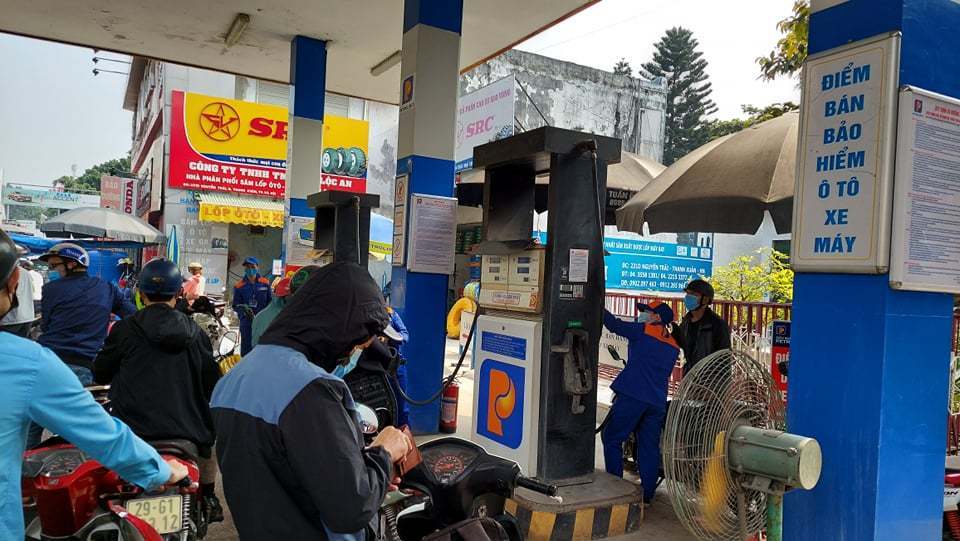Vietnam: High taxes and fees cause jump in petrol prices
Taxes and fees make up nearly 40 percent of the petrol price. The environmental protection tax is now at the ceiling level.
Each liter of petrol sold bears a number of taxes, including import tax, special consumption tax, environmental protection tax and VAT (value added tax).
There are also other items which are not taxed but included when calculating petrol prices, such as standard cost, profit norm and price stabilization fund.
The petrol price structure has eight items, including taxable CIF price (the cost price + transportation fee), import tax (10 percent), VAT (10 percent), luxury tax (10 percent on RON95 and 8 percent on E5) and environmental protection tax (VND3,800 per liter on E5 and VND4,000 on RON95).
The other costs include business standard cost (VND1,050 per liter of RON95 and VND1,250 per liter of E5), and standard profit (VND300 and contributions to price stabilization fund, which fluctuate in every period).
The selling price of E5 petrol after the latest price adjustment on October 26 is VND23,110 per liter and the price of RON95 is VND24,430. Taxes account for 39 percent of the selling price of E5, while the figure is 38 percent for RON95.
Of the four taxes imposed on petroleum products, environmental protection tax accounts for the highest proportion. The tax is fixed in amount of money, not percentage tax. Therefore, the environmental protection tax is unchanged despite the petrol price fluctuations.
When the petrol price dropped sharply in March 2020 to VND12,560 per liter of RON95, the environmental protection tax then made up 49 percent of the price per liter of RON95 and 47 percent of E5.
Prior to that, the Ministry of Industry and Trade (MOIT) proposed that the Government instruct the Ministry of FInance (MOF) to have environmental protection tax reductions to reasonable levels.
MOIT said the proportion of taxes and fees in petroleum prices were at high levels (55-60 percent of petrol prices and 35-40 percent of diesel prices). Of these, the environmental protection tax accounted for 32 percent of petrol price and 11-20 percent of diesel price.
The ministry also proposed further reducing the environmental protection tax on biofuel E5RON92 to create a wide price gap between normal petrol and biofuel to encourage the use of biofuel.
It believed that the environmental protection tax of E5, which was equal to 95 percent of the tax of RON92, was unreasonable, because E5RON92 had 95 percent RON92 and 5 percent ethanol.
It stressed that it was necessary to consider emissions when using E5 to define tax.
However, the environmental protection tax remains unchanged.
How much to tax?
Under the Law on Environmental Protection Tax, which took effect on January 1, 2012, petrol products are subject to environmental protection tax. The law sets the tax frame and stipulates that the NA Standing Committee will define environmental protections
tax in accordance with the law.
Since then, the environmental protection tax has been raised many times.
Since January 1, 2012, petrol began bearing a tax of VND1,000 per liter and diesel VND500, while kerosene, mazut and lubricant are VND300 per liter.
On May 1, 2015, the National Assembly Standing Committee agreed on the tax increase from VND1,000 per liter to VND3,000 for petrol and other products.
Since January 1, 2019, the National Assembly Standing Committee agreed on the tax increase to the ceiling level, which meant that the environmental protection tax increased by another VND1,000 per liter to VND4,000.
As such, the collections from environmental protection tax to the total state budget revenue have increased from 1 percent to over 4 percent (4.07 percent in 2019).
Under the 2015 Law on State Budget, the collections from taxes, fees and other receipts, including the environmental protection tax, will be integrated into the state budget, which means that the collections from environmental protection tax will be reserved only for environmental protection.
MOF said the spending on environmental protection in reality is higher than collections from the environmental protection tax. The management of the collection from the tax is implemented in accordance with the Law on the State budget and related legal documents.
The prices of goods and services have begun escalating following the petrol price hike. The expenses on petroleum products account for 3.52 percent of total production costs of the national economy.
Luong Bang
Source: https://vietnamnet.vn/en/feature/high-taxes-and-fees-are-behind-high-petrol-prices-788657.html


 Thailand
Thailand




